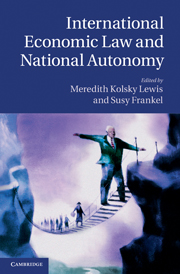Book contents
- Frontmatter
- Contents
- Notes on contributors
- Acknowledgements
- Introduction
- PART I International economic law: conceptions of convergence and divergence
- PART II WTO treaty interpretation: implications and consequences
- PART III Responding to international economic law commitments
- 8 Safety standards and indigenous products: what role for traditional knowledge?
- 9 The GATS and temporary migration policy
- 10 A different approach to the external trade requirement of GATT Article XXIV: assessing ‘other regulations of commerce’ in the context of EU enlargement and its heightened regulatory standards
- PART IV Transformations in international economic law
- Index
- References
10 - A different approach to the external trade requirement of GATT Article XXIV: assessing ‘other regulations of commerce’ in the context of EU enlargement and its heightened regulatory standards
from PART III - Responding to international economic law commitments
Published online by Cambridge University Press: 10 January 2011
- Frontmatter
- Contents
- Notes on contributors
- Acknowledgements
- Introduction
- PART I International economic law: conceptions of convergence and divergence
- PART II WTO treaty interpretation: implications and consequences
- PART III Responding to international economic law commitments
- 8 Safety standards and indigenous products: what role for traditional knowledge?
- 9 The GATS and temporary migration policy
- 10 A different approach to the external trade requirement of GATT Article XXIV: assessing ‘other regulations of commerce’ in the context of EU enlargement and its heightened regulatory standards
- PART IV Transformations in international economic law
- Index
- References
Summary
Introduction
Disappointed with the pace of multilateral trade talks, WTO members have turned towards regionalism, which has undermined the global trading system. Thus, regionalism has been influenced by political and other socioeconomic factors. Moreover, in some regulatory fields, multilateral rules have not been sufficiently developed or are not easily susceptible to consensus. Therefore, regional trade agreements (RTAs) operate increasingly in those fields, which may be problematic for third countries affected by regional trade. Developing countries might especially be affected by RTAs since there are no effectively enforced multilateral rules and thus no meaningful control mechanisms over RTAs. Some RTAs are particularly advanced in achieving WTO-plus provisions in the absence of multilateral rules. This feature of RTAs has led some to assess them as ‘building blocks’ since they argue that RTAs serve as a platform for new rule-making exercises. Others, who are critical about regionalist trends, point out the risk the multilateral trading system (MTS) runs due to fragmenting trade rules at the regional level, and thus increases the difficulty in agreeing multilaterally on new issues.
Furthermore, it is largely accepted that GATT Article XXIV, which regulates regional trade agreements, lacks clarity. There have been several attempts to clarify it and an Understanding on the Interpretation of Article XXIV has been reached, yet questions remain. Arguably, the Understanding brings significant clarification of the text of Article XXIV through legislative action only to the internal trade requirement in relation to customs unions (CU).
- Type
- Chapter
- Information
- International Economic Law and National Autonomy , pp. 216 - 240Publisher: Cambridge University PressPrint publication year: 2010



